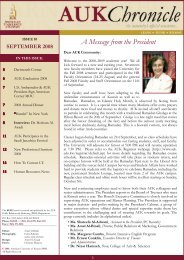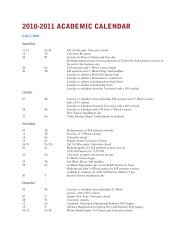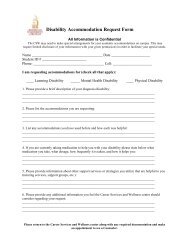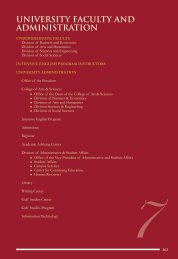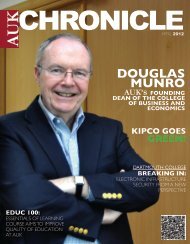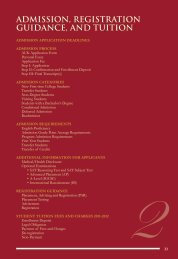RethinkingEntrepreneurship:Integration in a LiberalEducation ContextM. Nauman Farooqi and Rosemary PolegatoAbstractThis paper describes a fundable, long-term strategy whichincorporates the study and practice of entrepreneurshipinto the student experience at a high-quality liberal educationundergraduate university. Parts of the program arealready delivered by a business department and madeavailable to students in other programs through well-developedlinkages with other disciplines. The program is based onentrepreneurship defined as the willingness to pursuenew product concepts, ideas and processes, and to obtainthe human, material and financial resources necessary toimplement a plan for achieving for-profit and non-profitobjectives. The context for the entrepreneurial activity maybe the creation of a start-up organization or the pursuit ofgrowth for existing small, medium or large organizationsacross a variety of industries and non-profit organizations.Thus, entrepreneurship is not just an end result, but anorientation (or attitude) that is part of how an individualrecognizes and approaches the development of ideas inany type of organizational setting. This conceptualizationand operationalization requires a dedicated, resource-basedfocus on entrepreneurship. More specifically, the recastingrequires leadership through contributions to curriculumdevelopment, the scholarship of teaching entrepreneurship(i.e., pedagogy of experiential entrepreneurship),and service to the larger community in collaborationwith business and government bodies. A long-term,capacity-building, sustainable program that is situatedwithin an existing business department is envisioned.Rethinking Entrepreneurship: Integration in aLiberal Education ContextThis paper describes a fundable, long-term strategy whichincorporates the study and practice of entrepreneurshipinto the student experience at a high-quality liberaleducation undergraduate university. The program wouldbe delivered by a business department and made availableto students in other programs through well-developedlinkages with other disciplines. The approach is in line withthe opportunities afforded by the university’s setting, whichbuilds on the track record of the Commerce Departmentin cultivating entrepreneurship, and which augmentsresources that presently exist in the department.What is Entrepreneurship?The underlying concept of entrepreneurship is a departurefrom the conventional association of entrepreneurshipsolely with small business, and also a departure from thenotion that entrepreneurship be taught in one to threeisolated courses in the business curriculum.Entrepreneurship is the willingness to pursue newproduct concepts, ideas and processes, and to obtainthe human, material and financial resources necessary toimplement a plan for achieving for-profit and non-profitobjectives. The context for the entrepreneurial activitymay be the creation of a start-up organization or thepursuit of growth for existing small, medium, or largeorganizations across a variety of industries and non-profitorganizations. Thus, entrepreneurship is viewed not justas an end result, but as an orientation (or attitude) thatis part of how an individual recognizes and approachesthe development of ideas in any type of organizationalsetting. A bank employee who, for example, designs a newinvestment package for a high net worth customer can bejust as entrepreneurial as a young graduate who opens anoutdoor store in an under-serviced market. Both recognizeopportunities and gather resources to package theirideas in a competitive setting. Thus, an entrepreneurialorientation encompasses not only knowledge (e.g., how tostructure financing, how to bring a product to market,how to analyze the competition …), but entrepreneurialskills (e.g., how to present ideas, how to deal with fundingagencies …) and entrepreneurial attitudes and behaviors (e.g.,confidence, risk-taking, adapting to conditions, actionoriented…). This multi-faceted view recognizes thebroad scope of an entrepreneurial orientation in action,rather than limit it to “bums in [course] seats”.Towards an Experiential Entrepreneurship ModelThe pedagogical approach that provides the educationalfoundation for the Entrepreneurship Model integratesKolb’s (1984) experiential learning model and Mitchell andJames’ (1989) perspective of the opportunity created througha dynamic interactive relationship between an individualand the environment. Joplin’s (1995) suggestion thatinteraction with one’s environment requires planned reflectiveactivities enhanced the philosophy and approach used.Experiential pedagogy is a participatory method oflearning which involves a variety of a person’s mentalcapabilities. Scholars, such as Corsun, Inman and Muller(1995) and Kolb, Rubin and McIntyre (1974), quote anancient Confucius statement, "I hear and I forget; I seeand I remember; I do and I understand," to convey thefoundation of this pedagogy.33
34What is experiential Learning?The concept of experiential learning was developed byDavid Kolb (1971). Kolb believed learning is a processwhereby knowledge is formed through the transformationof experience (Vince, 1998). Kolb introduced a learningcycle, which is one of the most well known illustrationsin management education. It is important in expressingthe nature of experiential learning, and has become asignificant subject in the experiential business environment.Many different perspectives argue whether Kolb’s modelmatched the reality of how well people actually learnthrough experience.Alon and Cannon (2000) defined experiential learningsimply as, “learning by doing”. O’Banion (1997) statedthat the experiential approach provided discovery andinvolvement for students as they collaborate in the learningprocess and assume responsibility for the decisions theymake. According to Kolb (1984), experiential learningis a process in which knowledge is created through thetransformation of experience. Hoover (1974) statedthat, “Experiential learning exists when a personallyresponsible participant(s) cognitively, affectively, andbehaviorally processes knowledge, skills, and/or attitudesin a learning situation characterized by a high level of activeinvolvement.” The Association for Experiential Educationdefines experiential education as, “a philosophy andmethodology in which educators purposefully engage withlearners in direct experience and focus reflection in orderto increase knowledge, develop skills and clarify values.”Specht and Sandlin (1991) explained that "experientiallearning focuses on ‘doing’ in addition to the ‘hearing’and ‘seeing’ that occur in a traditional lecture class."They also believe that experiential learning involves astructured activity wherein material and principles whichare encountered are incorporated and applied to new anddynamic situations.There is widespread support of the benefits of experientialpedagogy. Toncar and Cudmore (2000) found thatexperiential learning activities increased the level ofstudent motivation and also long-term retention. Wynd(1989) stated that “teaching methods that actively engagestudents in the learning process enhance student learningand development”. Gaidis and Andrews (1990) suggestedstudents learn better due to the active involvement withconcrete experiences.Bridging the gap. According to Finney (2004) teachingundergraduate business students is challenging as theyhave little or no business experience which would allowthem to link theory with real-world practice. Experientiallearning allows business educators to bridge this gap. Areview of literature in this area suggests that businesseducators are incorporating this pedagogy actively andhave been achieving positive results. One of the reasonsfor the increased interest in experiential learning inbusiness education is due to the fact that the pedagogyallows for development of student’s “real world” skills(Alon & Canon, 2000).Experiential pedagogy has been applied across variousbusiness disciplines. Finney (2004), Bobbit (2000), Alonand Cannon (2000), and Gremler et al. (2000) describedseveral successful applications in the field of marketing.Falkenberg, Russell and Ricker (2000) reported on theapplication of the experiential approach in a projectmanagement course. Hogan (1992) reported on theapplication in an organizational behavior course. Gruca(2000) described an experiential application which integratedthe disciplines of marketing, finance, and technology.According to Finney (2004) there is an increased levelof awareness and support for the development ofexperiential-based courses in business. According to Finney,the results obtained thus far have been encouraging.Experiential learning in practice. An experientiallearning environment differs from a traditional classroomenvironment by placing students in situations that allowthem to experience the challenges and processes ofpractical life. Goal-orientation, teamwork, decision-making,observation, thinking, and action-taking are major areasthat are developed in an experiential learning environment.Experiential learning integrates theoretical knowledgewith practical acumen as students are required to workin teams and demonstrate leadership skills. Communityorganizations, government departments, and privatecorporations now recognize that experiential learningregimens have a significant, positive impact on thedevelopment of learners.Experiential learning has become popular in manycountries around the world, including Canada.Experiential learning has been used in work settings,military training, professional certification, independentstudy, and entrepreneurial situations. For instance, inthe workplace, companies are using experiential learningin the training of employees, who are made to activelyexperience, explore, and develop target skills and behaviors.
- Page 2 and 3: About AUK Occasional Papers:The AUK
- Page 4 and 5: higher education is distinguished b
- Page 6 and 7: The Impact of a Glass Ceilingon Wom
- Page 8 and 9: more women a chance to flourish in
- Page 10 and 11: consider other factors such as the
- Page 12 and 13: academically unprepared…you must
- Page 14 and 15: EmotionalSignificant variations in
- Page 16 and 17: Advising and OrientationOther impor
- Page 18 and 19: etention. However, in addition, the
- Page 20 and 21: Hadi and Llabre (1998) assessed int
- Page 22 and 23: the event was encoded in parallel a
- Page 24 and 25: Public Health Impacts of Iraq’s 1
- Page 26 and 27: college work and have inadequate pr
- Page 28 and 29: memorization and repetition. This a
- Page 30 and 31: other in the pursuit of higher grad
- Page 32 and 33: for quality assurance, an organizat
- Page 36 and 37: This type of training leads to enha
- Page 38 and 39: In short, Mount Allison students ha
- Page 40 and 41: Joplin, L. (1995). On defining expe
- Page 42 and 43: Figure 1. ExperientialEntrepreneurs
- Page 44 and 45: Kuwait - satellite television, cult
- Page 46 and 47: ReferencesAbt, V. & Seesholtz, M. (
- Page 48 and 49: interest in continuing to manipulat
- Page 50 and 51: Though corruption poses fundamental
- Page 52 and 53: A Cross-Cultural Modelof Innovation
- Page 54 and 55: were conceived as associations of c
- Page 56: others. In this case, confident pos
- Page 59 and 60: 58REFERENCESAmason, A. (1996) ‘Di
- Page 61 and 62: Shelton, C. and Darling, J. (2004)
- Page 63 and 64: 62• recycle natural resources use
- Page 65 and 66: 64Table Kuwait Fact Profile on Tran
- Page 67 and 68: Table Transportation and Associated
- Page 69 and 70: 68• Third, each mode of transport
- Page 71 and 72: 70• Prepare a Bank Group transpor
- Page 73 and 74: 7219. Stratford,A. (1974). Airports
- Page 75 and 76: 74may be developed in a safe and or
- Page 77 and 78: 28. Tables - 1 Environmental Manage
- Page 79 and 80: 6) EnvironmentalAwarenessNo baselin
- Page 81 and 82: 80Iran, the US, and HighlyEnriched
- Page 83 and 84: 82since the 1951 nationalization of
- Page 85 and 86:
8450% of the population is astonish
- Page 87 and 88:
86The US also approved the Shah’s
- Page 89 and 90:
88George W. Bush’s State of the U
- Page 91 and 92:
90when Iran could not keep up with
- Page 93 and 94:
92rich states, the decrease of natu
- Page 95 and 96:
94indigenous training. Specifically
- Page 97 and 98:
96It is important to note that Russ
- Page 99 and 100:
Table 1: Nuclear Powered States and
- Page 101 and 102:
100Foucault, Michel. “What are th
- Page 103 and 104:
102Ramazani, Rouhollah K. “Iran
- Page 105 and 106:
104My SCORE, OurMATCH: CommunityPar
- Page 107 and 108:
106with a mate while he does mechan
- Page 109 and 110:
108dimensions of life including for
- Page 111 and 112:
correlated to the commitment and on
- Page 113 and 114:
REFERENCESBryce, J, Frigo, T, McKen
- Page 115 and 116:
GDP $21,300, GDP growth rate 6.8%,
- Page 117 and 118:
• Less than half of the people su
- Page 119 and 120:
118TABLE 4: # 1 Gulf Country in Eco
- Page 121 and 122:
120• More men than women indicate
- Page 123 and 124:
TABLE 8: Why? X GenderGENDERMALE FE
- Page 125 and 126:
TABLE 11: Success in improving Livi
- Page 127 and 128:
TABLE 14: Success in preserving Cul
- Page 129 and 130:
• Gender wise, more men felt that
- Page 131 and 132:
TABLE 18: How foreign workers are t
- Page 133 and 134:
• In terms of the preference of e
- Page 135 and 136:
TABLE 24: Should Oil be the Basis f
- Page 137 and 138:
F i gur e 18: S hould K uwa it J oi
- Page 139 and 140:
13811. What do you think about the
- Page 141 and 142:
140Conditions of Kuwaiti Dependence
- Page 143 and 144:
1422) if the alien has no means of
- Page 145 and 146:
144offered Mubarak recognition as a
- Page 147 and 148:
146labor regulations and enforcemen
- Page 149 and 150:
148intensifying suspicion and hosti
- Page 151 and 152:
150Commission on Freedom of the Pre
- Page 153 and 154:
Even the viceroy of India, Lord Cur
- Page 155:
Christine PiconeAustralian College



